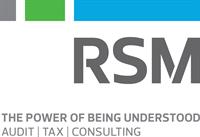The March Data, The First In A Series Of Monthly Readings, Revealed That Economic Sentiment Plunged, As Middle Market Leaders Express Concerns Over The Pandemic’s Lasting Effects.
RSM US LLP (RSM) – the nation’s leading provider of audit, tax and consulting services focused on the middle market – today announced results of the March reading for its RSM US Middle Market Business Index (MMBI). The MMBI is typically a quarterly index, but the firm will release monthly installments of the MMBI for the duration of the COVID-19 pandemic. As middle market businesses continue to feel the Coronavirus fallout within their organizations, the monthly MMBI data aims to keep a stronger pulse on sentiment among middle market business leaders in a time of increased uncertainty and rapid change.
The March data, released today, revealed that the MMBI composite score fell 21.5 points to 110.3, down from the 131.8 in the first quarter of 2020, on a seasonally adjusted basis. The severe drop in confidence was driven by concerns from middle market business leaders around the pandemic’s long-term impacts on the economy, revenue and earnings. Additionally, the MMBI reached a new low in March, dipping beneath the prior low recorded in the fourth quarter of 2015, when middle market companies grappled with uncertainty over price inflation following sharp declines in oil prices and other commodities.

Of the middle market executives polled during the month, 61% said the economy has worsened, and 51% expect a continued downturn over the next six months. Thirty-eight percent of respondents saw gross revenues decline, while 45% expect them to drop in the next six months. A little more than a third (36%) said net earnings decreased in March, and 43% see them falling in the next six months. Employment also saw a significant impact, with 30% of those polled indicating that hiring had decreased in March, and 31% saying they expect it to decrease over the next six months.
“The March MMBI reading is consistent with a recession in the middle market and the broader economy that has been fueled by the worldwide coronavirus pandemic. In just weeks, stay-at-home orders and closures of non-essential businesses have sharply curtailed demand, and the once tight labor market has transformed into an environment on par with the Great Depression, with U.S. unemployment surging above 13%,” said Joe Brusuelas, RSM US LLP chief economist. “We expect the national economy to remain shut down until at least June, when we hope to see businesses slowly beginning to reopen brick-and-mortar operations. Once the economy restarts, we foresee the recession ending in the third quarter of 2020, and recovery beginning during the fourth quarter of the year.”
RSM will continue to publish monthly installments of the MMBI for the extent of the coronavirus pandemic. To stay informed with the latest insights, ideas and countermeasures to minimize the outbreak’s negative effects, as well as prepare for future emergency events, visit RSM’s COVID-19 Resource Center. It also includes information about the newly announced $600 billion Main Street Lending Program and related measures from the federal government that are meant to stem the fallout from this global health crisis.
The March 2020 MMBI data was collected between March 16 and March 30.
About the RSM US Middle Market Business Index
RSM US LLP and the U.S. Chamber of Commerce have partnered to present the RSM US Middle Market Business Index (MMBI). It is based on research of middle market firms conducted by Harris Poll, which began in the first quarter of 2015. The survey is conducted four times a year, in the first month of each quarter: January, April, July and October. The survey panel consists of 700 middle market executives and is designed to accurately reflect conditions in the middle market.
Built in collaboration with Moody’s Analytics, the MMBI is borne out of the subset of questions in the survey that ask respondents to report the change in a variety of indicators. Respondents are asked a total of 20 questions patterned after those in other qualitative business surveys, such as those from the Institute of Supply Management and National Federation of Independent Businesses.
The 20 questions relate to changes in various measures of their business, such as revenues, profits, capital expenditures, hiring, employee compensation, prices paid, prices received and inventories. There are also questions that pertain to the economy and outlook, as well as to credit availability and borrowing. For 10 of the questions, respondents are asked to report the change from the previous quarter; for the other 10 they are asked to state the likely direction of these same indicators six months ahead.
The responses to each question are reported as diffusion indexes. The MMBI is a composite index computed as an equal weighted sum of the diffusion indexes for 10 survey questions plus 100 to keep the MMBI from becoming negative. A reading above 100 for the MMBI indicates that the middle market is generally expanding; below 100 indicates that it is generally contracting. The distance from 100 is indicative of the strength of the expansion or contraction.
About RSM US LLP
RSM’s purpose is to deliver the power of being understood to our clients, colleagues and communities through world-class audit, tax and consulting services focused on middle market businesses. The clients we serve are the engine of global commerce and economic growth, and we are focused on developing leading professionals and services to meet their evolving needs in today’s ever-changing business environment.
RSM US LLP is the U.S. member of RSM International, a global network of independent audit, tax and consulting firms with more than 43,000 people in more than 120 countries. For more information, visit rsmus.com, like us on Facebook, follow us on Twitter and/or connect with us on LinkedIn.


